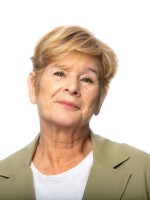Journalist Tara Roberts has written about a community of divers, who discover and uncover slave shipwrecks around the world.
Her book, Written in the Waters: A Memoir of History, Home, and Belonging, discusses her journey towards becoming a scuba diver, the relevance of Black history, and the importance of teaching the next generation to explore.
VPM News Morning Edition host Phil Liles sat down with Roberts to discuss her story.
This interview has been lightly edited for clarity and style.
Phil Liles: Welcome, Tara.
Tara Roberts: Hi, thank you for having me.
Tell me about this book.
The book is a chronicle of my journey over the last seven years, following a group of Black scuba divers who dive for and help document slave shipwrecks around the world.
I became a scuba diver so that I could help tell the story — I wasn't a scuba diver before, but I really wanted to be able to travel with the divers and actually dive with them.
Throughout this process, I tell stories of the divers, I tell stories of the ships that we're finding and I tell stories about how this whole journey completely transformed me.
How did it transform you?
Well, before I started this — I'm a journalist by trade — I was mid-career doing something completely other, but I left my job. I just felt like there was something so important about the work that these divers were doing, and I wanted to tell that story.
I didn't think that this story would become so personal for me. I just felt like this was history that deserved to be in the world. It was something that we needed to know collectively. But I think, on a personal level, I was a bit afraid to connect to this history because it felt like it might be too painful and too traumatic.
But what I found through this journey: I found some of my own history, which I wasn't expecting to find. And I found that these are not just stories of death and stories of tragedy, but these are also stories of resilience, stories of survival, stories of accomplishment.
I have connected to my history in a way that I never could have expected. I didn't know anything about the ocean, but the ocean is this magical, beautiful place.
What were your sensations being in the ocean searching for those wreckages?
Well, being in the water, just in general, it's such a peaceful and calm place. It's a meditative moment for me. You have to be really present in the water, and you have to be conscious of your breath constantly. It's like a very meditative moment.
And then there's something being around a community of other divers, because that's one crystal clear rule of diving: You can never dive alone. So you're diving in community with these other divers that have the same goal and the same intent, and then you're down there finding history that has just been lost to the world.
Part of the work that we're doing under the water is helping to bring those stories back into memory.
Where have you found those wreckages?
The diving that I've done is with a group called Diving With a Purpose, and they are this organization of volunteers, primarily people of African descent. They've got missions that are happening in conjunction with other groups in Mozambique, Senegal, South Africa, Costa Rica, and they've got other ones that are coming down the pipeline.
Are you planning on going to any other locations to dive with the group?
There's some stuff in progress, so we'll see where the funding comes and when those trips happen, but I try to support and to be with them as much as I can.
Diving with a Purpose is a group that's got two strands. One strand focuses on underwater archaeology — this emerged history of people of African descent around the world — but it also has a citizen science component where it is training, especially young people, to be citizen scientists in the water and to do coral reef restoration.
They're also doing work in Honduras, in South Africa. They're [planning] to do some work in Liberia, perhaps Benin. So, the work is growing all over the world.
I think it's so important — now, more than ever — to help educate our younger population, because someday they're going to be taking things over. Have you gone into schools?
I am a National Geographic Explorer in Residence, and National Geographic has a pretty big reach into school systems; they do these programs called Explorer Classrooms.
There's the book, but we also have a podcast out called Into the Depths — it's a six-episode limited series that tells the stories of the divers, [of] the ships, of the wrecking events. And if you really want to hear from the divers themselves, you can listen inside of this almost audio documentary.
And we've done a listening guide for classrooms, so that teachers and educators and students can explore themes together and then Diving With a Purpose, they train people as young as 16 to do this work in the ocean. And all of the young people who participate are required to give presentations back in their schools about this work.
I think we're beginning to sort of spread the word and encourage young people to know that this is your history — you've got to lean into this and to help preserve it.
What do you hope that people will learn from reading your memoir?
First, I hope that people realize that this history is not just Black history. It's not even just American history. This is global history.
The transatlantic slave trade was one of the most monumental events in human history. It was 400 years of bringing Africans to the Americas. It created wealth; it destroyed wealth; it saw the rise of socioeconomic [and] geopolitical powers that are still in power today — it created our world.
But there's a way that it is minimized, it's ignored, it's distorted in the way that we look at it and we understand it. So, I hope that the book helps to bring interest in looking at that past.
The trade also served to connect us. Africa, Europe, North America, South America — there's a way that we are interwoven because of the trade. We wouldn't be the same without it. When you think of the transfer of cultures, ideas, philosophies, religions, goods, people — we are a part of each other. We don't see each other often that way, but perhaps looking at the trade through new eyes can help us see that we are a part of each other.
The other thing that I want people to know [is] that it is not too late to step into your passion. It’s never too late. You got to listen to that inner voice, follow your curiosity, and there's a way that it could lead you to places you never, ever imagined.
Tara, thank you so much for being here today. It's been such a pleasure.
Thank you for having me. It's been great.




